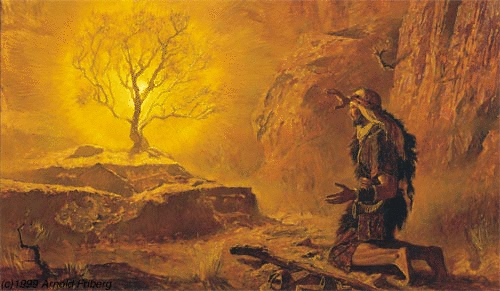While reading Carey Walsh's Chasing Mystery (Walsh is a professor of theology at Villanova University), I came across this exposition of Moses' encounter with the burning bush, which I found to be really illuminating:
Moses noticed something out of the ordinary, the subtlety of the branches not being consumed by the fire. This subtlety for him was worth a second look and would presumably take a few moments to notice. Then God called him. In other words, the scene depicts not overpowering divine presence but rather a relational give-and-take between God and Moses. God, as it were, waits for Moses to notice. Moses, for his part, did not read the bush as an object; he encountered it. Divine presence is inviting rather than coercive. Moses was someone who was paying attention. He has the makings of faith in him, the attentiveness. It is a test of sorts from God, a test for readiness, not merit, as if God were saying, "If Moses notices the difference, then I shall speak to him." . . . I want here to propose Moses as a model for approaching holiness, specifically that of the Holy Scriptures. Whereas God initiates by manifesting his presence--revelation--Moses is receptive. There is something already primed in Moses to slow down and pay attention to the ordinary, from which the holy blooms.
Learning how to notice, how to observe, how to see the slight variation: a reminder of how the relationship with God can hinge upon skills and capacities that don't necessarily have an immediate connection with theology. What an insight for educators. The more a person hones his or her capacities for patient, careful attention, the more one is readying oneself for finding God in all things.









“…learning how to notice, how to observe…” Your words resonate with a recent spiritual experience I had. Not long ago I was struggling with a personal spiritual matter and in an act of desperation I left my office one afternoon and found a chapel to pray. Although I left feeling better I was not confident that I would be afforded any special help “grace” to remedy my malady but remained resolved to continue to work through my issue. Oddly that evening as I slipped into bed, trying not to disturb my sleeping wife, I noticed a small statue of Our Lady of Fatima with a slight glow on my wife’s dresser. This was no miracle however, as I quickly remembered that this statue had been on my wife’s dresser for years and that it’s made to “glow in the dark” for a period after direct light exposure. But what caught my attention, and gave me an adrenaline rush with a resounding sense of peace however, was the fact that the statue has sat on her dresser for ten plus years and yet I never really noticed its radiance before. Despite the realization that there was nothing extraordinary about the phenomena I felt a sense that a sign was given to me, a gift, yet one experienced in a very ordinary way. The experience afforded me a spiritual healing. As a result I’m more inclined now to look for God in my ordinary comings and goings with the belief that at times his grace will shine forth. DJ Merges